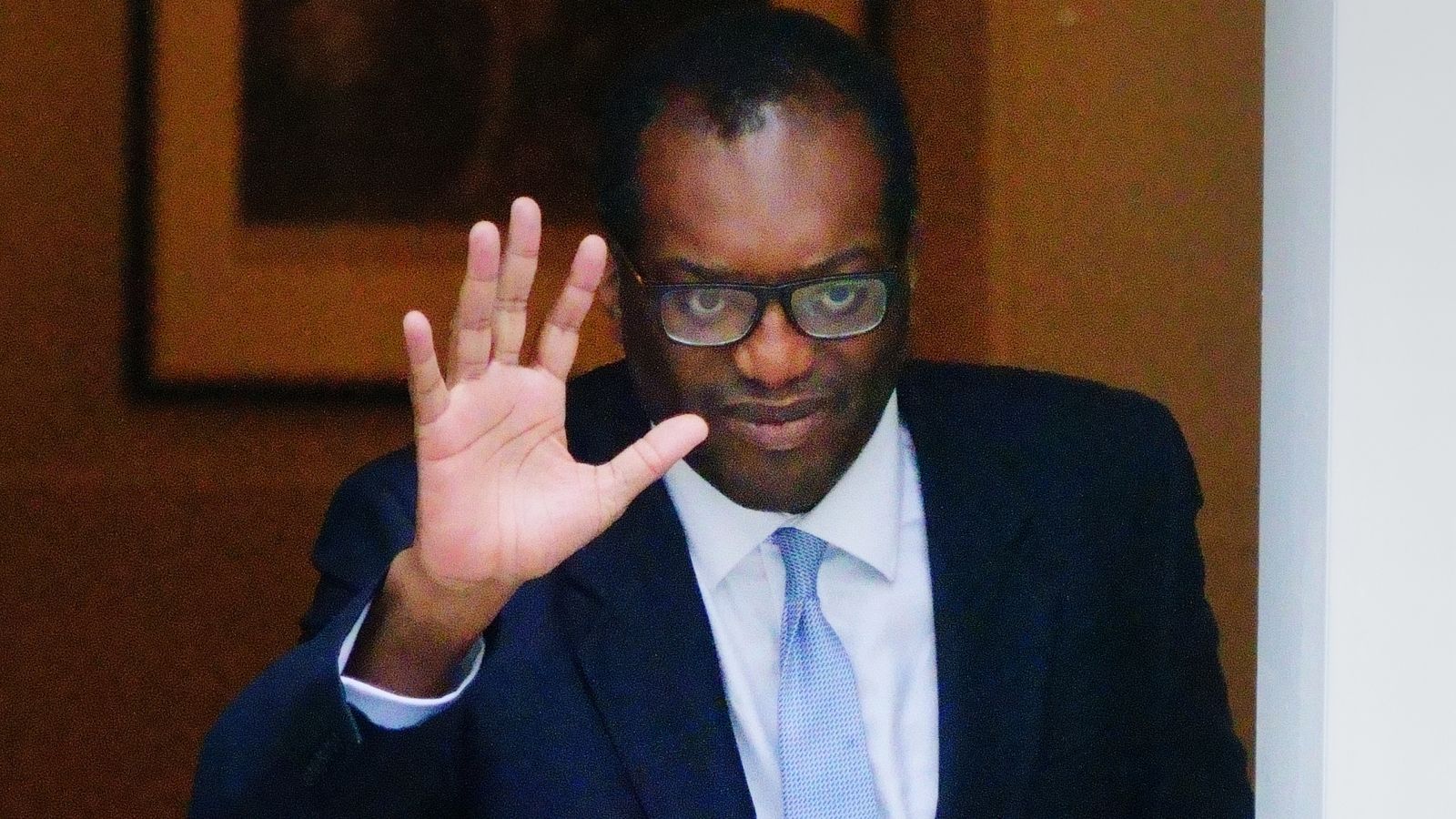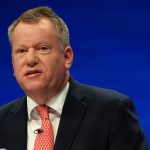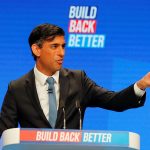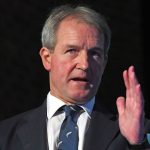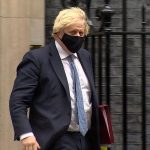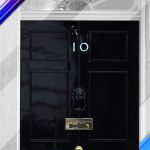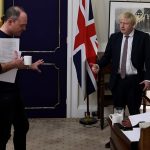Kwasi Kwarteng has become the second shortest-serving chancellor in UK history.
Just behind Conservative Ian Macleod, who died of a heart attack 30 days after he took the job in 1970, Mr Kwarteng lasted just 38 days in his role.
Please use Chrome browser for a more accessible video player
Unapologetic Truss says she ‘acted decisively’ – follow politics latest
Here Sky News looks back at his short time at Number 11 Downing Street.
6 September
After being elected prime minister by 57.4% of Conservative Party members the previous day, Liz Truss appoints Kwasi Kwarteng as her chancellor.
He was previously secretary of state for business, energy and industrial strategy.
Liz Truss sacks Kwasi Kwarteng and scraps more of his mini-budget
‘I want to be honest, this is difficult’: Liz Truss confirms U-turn after sacking chancellor Kwasi Kwarteng
Treasury chief secretary Chris Philp moved aside and replaced by Edward Argar amid economic chaos
Friends for over a decade and described by some as “ideological soulmates” and “Batman and Robin”, Ms Truss and Mr Kwarteng even live on the same street in Greenwich, southeast London.
In 2012 they co-wrote a book called ‘Britannia Unchained: Global Lessons for Growth and Prosperity’ about the UK’s post-Brexit potential.
8 September
A House of Commons debate on the energy crisis is interrupted by news that the Queen is gravely ill.
Prime Minister Liz Truss and Labour leader Sir Keir Starmer are rushed out of the chamber.
At 6.30pm it is announced that the Queen has died.
Parliament is suspended and due to return on 21 September.
Plans for a so-called ’emergency budget’ earmarked for 19 September are delayed for the Queen’s funeral to take place.
10 September
The chancellor is among members of the cabinet to meet the new King at Buckingham Palace with the prime minister.
19 September
The Queen’s state funeral takes place at Westminster Abbey.
Mr Kwarteng is among the first recognisable faces to arrive but sparks outrage when he is seen laughing with colleagues ahead of the service.
21 September
When MPs return to the House of Commons, Liz Truss unveils her first major policy of her premiership – an ‘Energy Price Guarantee’ to help reduce people’s utilities bills.
Amid the cost of living crisis, Ms Truss caps energy prices per unit and claims the average household will not pay more than £2,500 a year in bills for the next two years.
She also lays out a six-month support scheme for businesses, which were previously unprotected by any cap.
The policy is estimated to cost £60bn, sparking concerns the government is borrowing too much money.
Mr Kwarteng says it will “bring security, growth to the economy and secure a better deal from consumers”.
23 September
The chancellor unveils his ‘mini-budget’ in the House of Commons. The government insists it is not a ‘mini-budget’ but a ‘fiscal event’. Mr Kwarteng refers to it as ‘The Growth Plan’.
Describing it as the “biggest package in generations”, he tells MPs he “won’t apologise” for trying to deliver growth with a series of dramatic tax cuts.
They are set to cost the public purse £45bn and include:
• Abolishing the 45% higher rate of income tax
• Cutting the basic rate of income tax to 19%
• Scrapping the planned increase in corporation tax from 19% to 25%
• Reversing Rishi Sunak’s National Insurance Health and Social Care levy
• Increasing the threshold for stamp duty payments to £250,000 – and £425,000 for first time buyers
• Scrapping planned curbs on banker’s bonuses
Mr Kwarteng claims the measures will “simplify” the UK tax system and make Britain “more globally competitive”.
The mini-budget is not accompanied by the normal costing plans from the Office for Budget Responsibility (OBR) as the government says it is not a traditional budget.
This means no one will know how it will be paid for until Mr Kwarteng’s next announcement on 23 November.
26 September
When trading resumes on global financial markets for the first time after the chancellor’s mini-budget, they react badly.
Experts claim this is because of a loss of confidence in the UK’s ability to pay its debts.
The pound falls by 5% to a record low against the dollar – at $1.0327.
Interest – or yields – on 10-year UK government bonds – or gilts – hit their highest since 2010 at 4.15%.
The Bank of England issues a statement saying it “will not hesitate to change interest rates as necessary”.
Mr Kwarteng says of the financial turmoil: “We’ve got to have a much more front-footed approach to growth and that’s what my Friday statement was all about.
“I think that if we can get some of the reforms… if we get business back on its feet, we can get this country moving, and we can grow our economy, and that’s what my focus is 100% about.”
28 September
The Bank of England makes the highly unusual move of agreeing to buy up UK government bonds for a set period of two weeks.
It says this is because if “dysfunction in this market continues or worsens, there would be a material risk to UK financial stability”.
Sky News’ economics and data editor Ed Conway claims that had the central bank not acted whole pension funds were at risk of dissolving by that afternoon.
Reports then begin to emerge of the PM being under pressure to sack her chancellor for causing market instability.
29 September
The independent body responsible for economic forecasting, the OBR, confirms in a letter to the SNP’s Ian Blackford that it had offered a forecast for the mini-budget, but the chancellor did not commission one.
Mr Kwarteng also fuels speculation he may only uprate benefits in line with people’s earnings – not inflation – a manifesto promise of Boris Johnson’s.
He said: “We are talking about helping people in the round. It is premature for me to come to a decision on that. But we are absolutely focused on making sure that the most vulnerable in our society are protected through what could be a challenging time.”
A YouGov poll reveals Labour has surged to a 33-point lead over the Conservatives.
30 September
In The Daily Telegraph, Kwasi Kwarteng promises a “credible plan” to get government spending under control.
He reaffirms his commitment to a full OBR report on 23 November.
1 October
A new poll by Opinium shows Liz Truss is less popular than Boris Johnson, and that Labour is well ahead of the Conservatives.
According to the results, the Tories have just 27% of the vote, while Labour boast 46%.
2 October
The Conservative Party conference begins in Birmingham.
In an interview with the BBC, Ms Truss admits she and Mr Kwarteng “should have laid the ground better” and says “I have learnt from that”.
On uproar over the 45% top rate tax cut, she appears to blame her chancellor, saying it was a decision made by him and something he didn’t discuss with the cabinet.
Read more:
From Eton scholar to chancellor that went spiralling
Truss: I want to be honest, this is difficult
Michael Gove also appears on the same programme to say the top tax rate cut was a “mistake” and that he may not vote for it.
An article in The Sunday Times claims that Mr Kwarteng met hedge fund managers in London before his mini-budget where they “egged him on” to pursue his sweeping tax cuts that would benefit them. This is denied by the government.
Please use Chrome browser for a more accessible video player
3 October
On the day of his speech at the Tory Party conference, the chancellor tweets: “It is clear that the abolition of the 45p tax rate has become a distraction from our overriding mission to tackle the challenges facing our country
“As a result, I’m announcing we are not proceeding with the abolition of the 45p rate of tax.
“We get it, and we have listened.”
His speech sees him admit: “What a day, it has been tough but we need to focus on the job in hand.”
Referring to his earlier U-turn, he adds: “We need to move forward. No more distractions. We have a plan and we need to get on and deliver it. That is what the public expect from the government.”
Please use Chrome browser for a more accessible video player
4 October
House of Commons leader and former Tory leadership candidate Penny Mordaunt insists that benefits should be uprated with inflation after rumours swirled that the PM and chancellor could be looking at linking them to people’s earnings to save money.
Reports emerge that in one conversation the chancellor blamed the “pressure” of the Queen’s death for any mistakes made in government.
5 October
In her speech that closes the party conference, Liz Truss pays tribute to her “dynamic” chancellor.
“Whenever there is change, there is disruption,” she says.
6 October
The chancellor holds a meeting with executives from some of the biggest UK High Street banks, including Barclays, Lloyds and NatWest, amid soaring interest rates on mortgages and hundreds of deals being withdrawn over uncertainty in the market.
10 October
Kwasi Kwarteng confirms he is bringing forward his costing of the mini-budget from 23 November to 31 October.
In a letter to the chairman of the Treasury Select Committee, he says: “I have previously written to inform you that an economic and fiscal forecast will be published alongside the Medium-Term Fiscal Plan on 23 November. I have decided to bring this date forward to 31 October.”
11 October
Appearing in front of MPs for the first time since his mini-budget, Mr Kwarteng promises his upcoming economic plan will be “relentlessly upbeat”.
He promises it will be an “absolute iron commitment to fiscal responsibility” and accompanied by a full OBR forecast.
On the same day, the Institute for Fiscal Studies publishes a report that says the government must save at least £62bn to restore market confidence.
12 October
The chief economist of the International Monetary Fund (IMF) tells Sky News that the mini-budget “complicated” the Bank of England’s plans to bring down inflation.
In her first Prime Minister’s Questions since the mini-budget, Ms Truss says that she will not cut public spending to balance the books.
13 October
Kwasi Kwarteng travels to Washington DC for talks with the IMF, which has called for the UK to focus on tackling inflation before it looks at growth.
But the chancellor’s trip is cut short, with sources claiming he needs to return early for discussions on his ‘medium-term fiscal plan’.
At home, Liz Truss faces mounting pressure to resign or sack her chancellor as more of her MPs threaten to rebel.
14 October
Friday’s edition of The Daily Telegraph sees Mr Kwarteng vow: “I’m not going anywhere.”
He is later seen entering Downing Street via a back entrance shortly before rumours he has been sacked are confirmed.
Mr Kwarteng issues a statement saying: “You have asked me to stand aside as your chancellor. I have accepted.”
He acknowledges “we have been colleagues and friends for many years” and stresses “your vision is the right one”.
Ms Truss replies: “As a long-standing friend and colleague, I am deeply sorry to lose you from the government.”
In contrast to his claims “you asked me to stand aside” she says: “I deeply respect the decision you have taken today.”
In a news conference hours after, she admits “this is difficult” and U-turns on her plans for cutting corporation tax.
Mr Kwarteng is replaced as chancellor by Jeremy Hunt – a former health and culture secretary.
